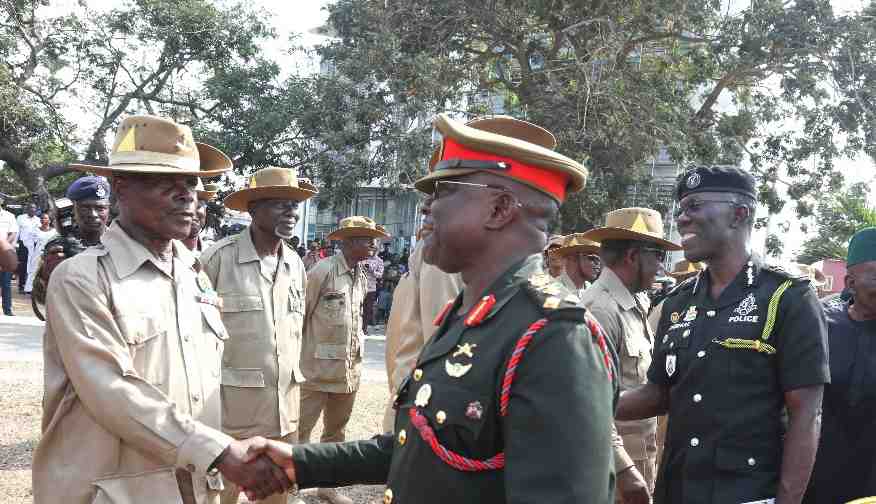A parade characterized by flag hoisting, sounding of the Last Post, reveille, and Veterans’ Roll Call, has been held to commemorate the 76th Anniversary of the 28th February Christianborg Crossroads Shooting incident – an occasion of remarkable significance to Ghana’s political independence struggle with colonialists rule.
The national parade was held at the Nationalism Park in Osu, Accra, Ghana, near the Black Star Square, on Wednesday, 28 February 2024, and was reviewed by the Vice President of Ghana – His Excellency (HE) Dr Mahamudu Bawumia.
The Vice President laid a wreath on behalf of the Government and people of Ghana, the Chief of the Defence Staff (CDS) of the Ghana Armed Forces (GAF) – Lieutenant General (Lt Gen) Thomas Oppong-Peprah, laid another on behalf of the Security Services, while the Board Chairman of the Veterans Association Ghana (VAG) – Major General CB Yaache (Rtd) laid another on behalf of Veterans.

Former Soldiers – Sergeant Adjetey, Corporal Attipoe, and Private Odartey-Lamptey, in their quest to seek justice and demand what legitimately belonged to them, were killed on the 28th February, 1948 at the Christiansburg Crossroad, Osu.
The contribution by the ex-servicemen to Ghana’s Independence cannot be over-emphasized in the political history of Ghana.
During the Second World War, the soldiers of the Gold Coast Regiment of the Royal West African Frontier Force fought alongside the allied forces. The Gold Coast Regiment were among the most decorated African soldiers, fighting alongside British troops in Burma. The ex-servicemen were promised pensions and jobs after the war.
However, the World War II veterans who had fought so gallantly and had received high commendation, were demobilized after the war and paid a pittance by way of war gratuity of about one shilling a day.

Jobs were scarce and their pensions were never disbursed. Several appeals made by the soldiers to the authorities fell on deaf ears.
On 28th February, 1948, the ex-servicemen together with other citizens of the country embarked on a peaceful march in an attempt to bring a petition to the Governor of the Gold Coast then, requesting the dispensation of promised pensions and other compensation for their valiant efforts during the war.
As the group marched towards the Governor’s residence at Christiansborg Castle, Osu, Accra, they were stopped and confronted by the colonial police, who refused to let them pass.
The British Head of Police then – Superintendent Imray, ordered his troops to shoot at the protesters, who hesitated, frustrating Imray, who grabbed his weapon and ultimately shot into the crowd, killing the three former soldiers: Sergeant Adjetey, Corporal Attipoe and Private Odartey-Lamptey, and injuring sixty other ex-servicemen.

In response to this violence, the population of Accra erupted into five days of rioting, from 28th February to March 3 1948, in which both Asian and European-owned stores and businesses were looted and more deaths occurred.
This incident that occurred on that fateful day, further fuelled anti-colonial movements to press the British Government to institute a committee, to investigate the killings and general disorder, who recommended self-government for the Gold Coast, subsequently leading to the attainment of political independence for Ghana.
Pictures credit: Office of the CDS
